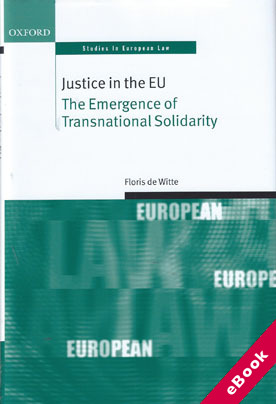
The device(s) you use to access the eBook content must be authorized with an Adobe ID before you download the product otherwise it will fail to register correctly.
For further information see https://www.wildy.com/ebook-formats
Once the order is confirmed an automated e-mail will be sent to you to allow you to download the eBook.
All eBooks are supplied firm sale and cannot be returned. If you believe there is a fault with your eBook then contact us on ebooks@wildy.com and we will help in resolving the issue. This does not affect your statutory rights.
In Justice in the EU: The Emergence of Transnational Solidarity, Floris de Witte argues that European Union law can be understood as an instrument for the elaboration of what justice is, means, and requires on the level beyond the nation state.
Approaching the question of justice from the European perspective, however, challenges us to think beyond the contractarian idea that equates justice with national political self-determination.
A proper model of justice demands a tiered institutional and normative understanding of justice, involving both the nation state and the EU, which can make sense of the new ties between individual citizens that the process of European integration continues to generate. It also requires that we construct a theory of transnational solidarity that can explain what those new ties tell us about our transnational obligations of justice.
This book tackles three issues in turn. It explains which precise institutional and normative structures are indispensable in the pursuit of justice; how the European Union can be understood to increase our capacity for the attainment of justice; and formulates a theory of transnational solidarity that informs the interaction between national and European spheres.
Three different types of transnational solidarity are identified and carefully traced throughout the case law of the Court of Justice: market solidarity, communitarian solidarity, and aspirational solidarity. Read together, these three transnational solidarities tell us exactly what justice means in the EU.